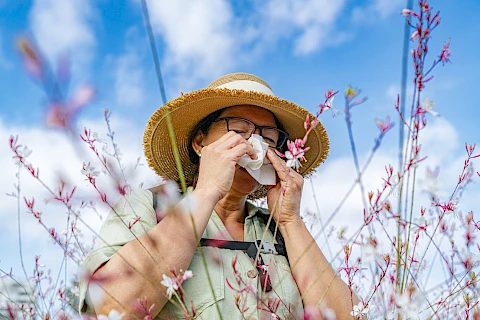
Allergies don't just affect children and middle-aged adults. They are common among seniors, who may experience symptoms differently due to aging. Finding ways to manage allergies without medication is becoming increasingly more necessary than ever, with many seniors preferring to or even requiring avoiding additional prescriptions due to drug interactions or side effects. Seasonal allergies can affect day-to-day well-being. Explore ways to support seniors in managing allergies through natural and lifestyle strategies.
Allergies in Seniors
Understanding the common allergens that affect seniors is helpful, so you know how best to assist them. Pollen, dust mites, mould, and pet dander are among the primary culprits. For seniors, allergies might present as persistent coughs, skin irritations, or sinus headaches. Aging can impact the immune system, sometimes leading to more intense reactions or difficulty identifying allergy triggers.
Reducing Allergen Exposure
Creating an environment that minimizes allergen exposure is the first step toward relief. Simple home adjustments can make a big difference. Air purifiers and filters, especially those with high-efficiency particulate air (HEPA) filters, can capture common allergens and improve indoor air quality. Regular cleaning routines, including frequent dusting and vacuuming with HEPA-filter vacuums, can significantly reduce allergens in the home.
Outdoor planning also helps with managing allergies. Caregivers should monitor pollen forecasts and schedule outdoor activities when pollen counts are low, usually in the late afternoon or after it rains.
Natural Remedies for Allergy Relief
In addition to minimizing exposure, several natural remedies can help alleviate symptoms. Herbal teas and supplements with ginger, peppermint, and chamomile can soothe allergy symptoms naturally. Saline nasal rinses can clear allergens from the nasal passages, relieving congestion. Essential oils and aromatherapy, such as eucalyptus or lavender, help open up airways and ease breathing.
Lifestyle Adjustments
Lifestyle factors also contribute significantly to managing allergies. Diet, hydration, and stress levels all make a difference. A balanced diet rich in fruits and vegetables can help strengthen the immune system. Foods high in omega-3 fatty acids, like salmon, can also support respiratory health. Ensure proper hydration by drinking enough water, which thins mucus in the airways, making breathing easier and reducing congestion. Stress management techniques such as deep breathing, yoga, or spending time in nature can keep stress levels down, which can help reduce the body's inflammatory response to allergens.
When to Consult Healthcare Providers
While non-medication strategies can be effective, sometimes professional guidance is necessary. Caregivers should be vigilant about symptoms that worsen or don't respond to home remedies, such as persistent wheezing or difficulty breathing. Regular health check-ups are necessary to monitor overall health and fine-tune allergy management plans. Doctors can help develop tailored strategies that might combine natural methods with minimal medication, fitting personal needs best.
Get Assistance This Allergy Season From Senior Helpers Kelowna
Managing allergies without medication is possible through reducing exposure, using natural remedies, and making lifestyle adjustments. However, recognize when professional intervention is necessary. Caregivers and seniors in the Kelowna area, including West Kelowna, Peachland, Penticton, Summerland, Winfield, and Lake County, should always feel empowered to seek qualified help.
Senior Helpers Kelowna can help seniors manage allergies by maintaining a clean living environment and reducing exposure to common allergens like dust, pollen, and mould. Caregivers can also prepare allergen-free meals, assist with shopping, and ensure that safety routines like handwashing and air filter changes are followed. While they don’t provide medical treatment, they can monitor for allergic reactions and support emergency preparedness by keeping prescribed tools like EpiPens accessible and contacting medical help if needed. For personalized support, contact us.